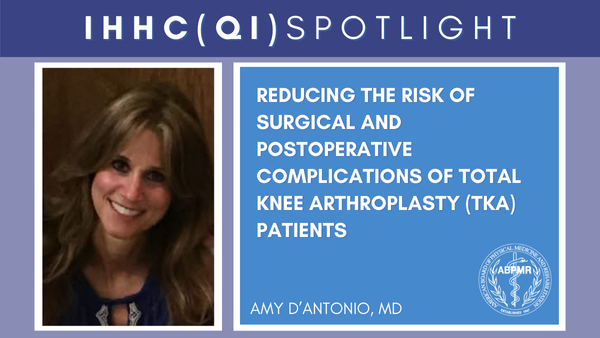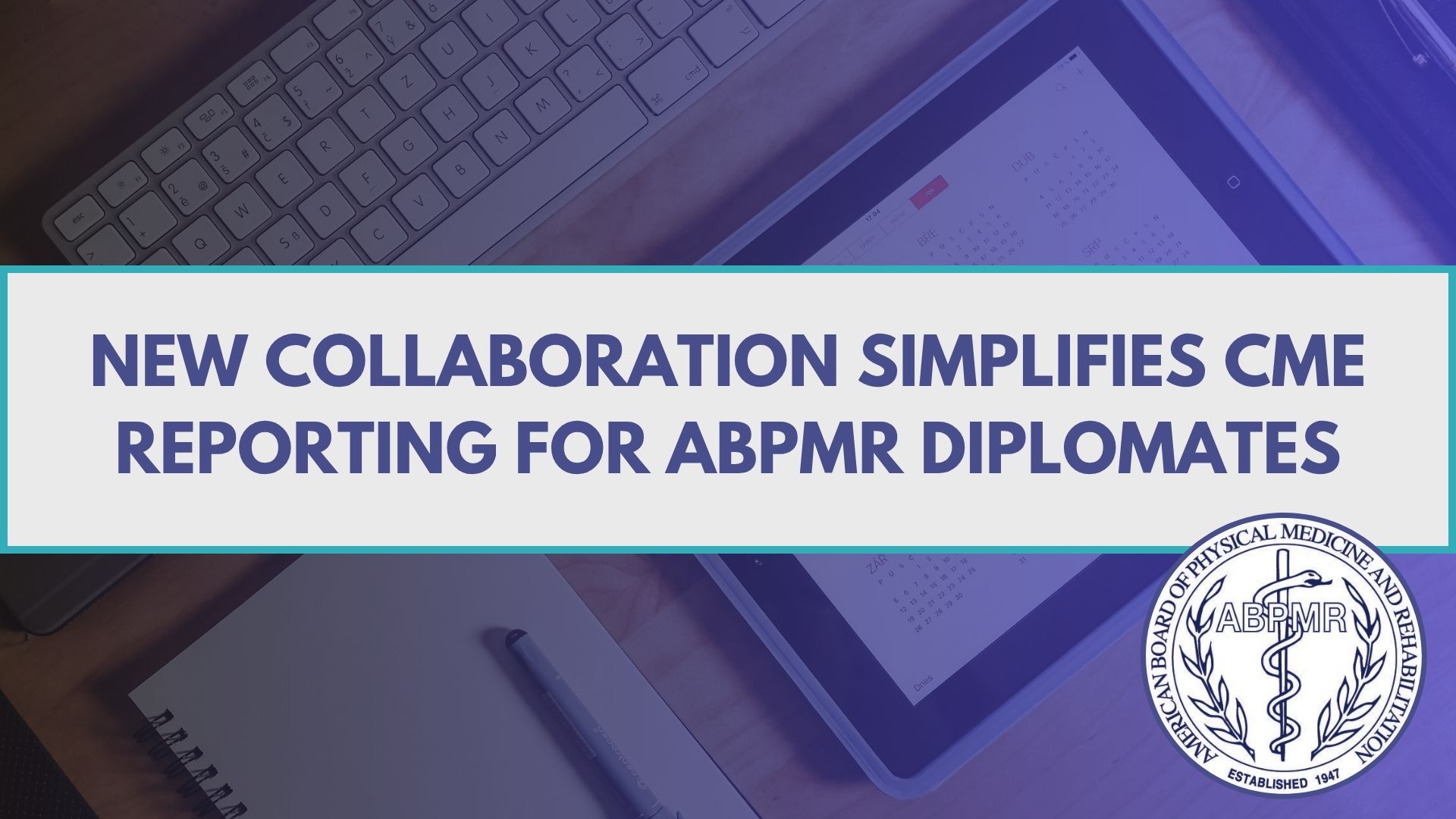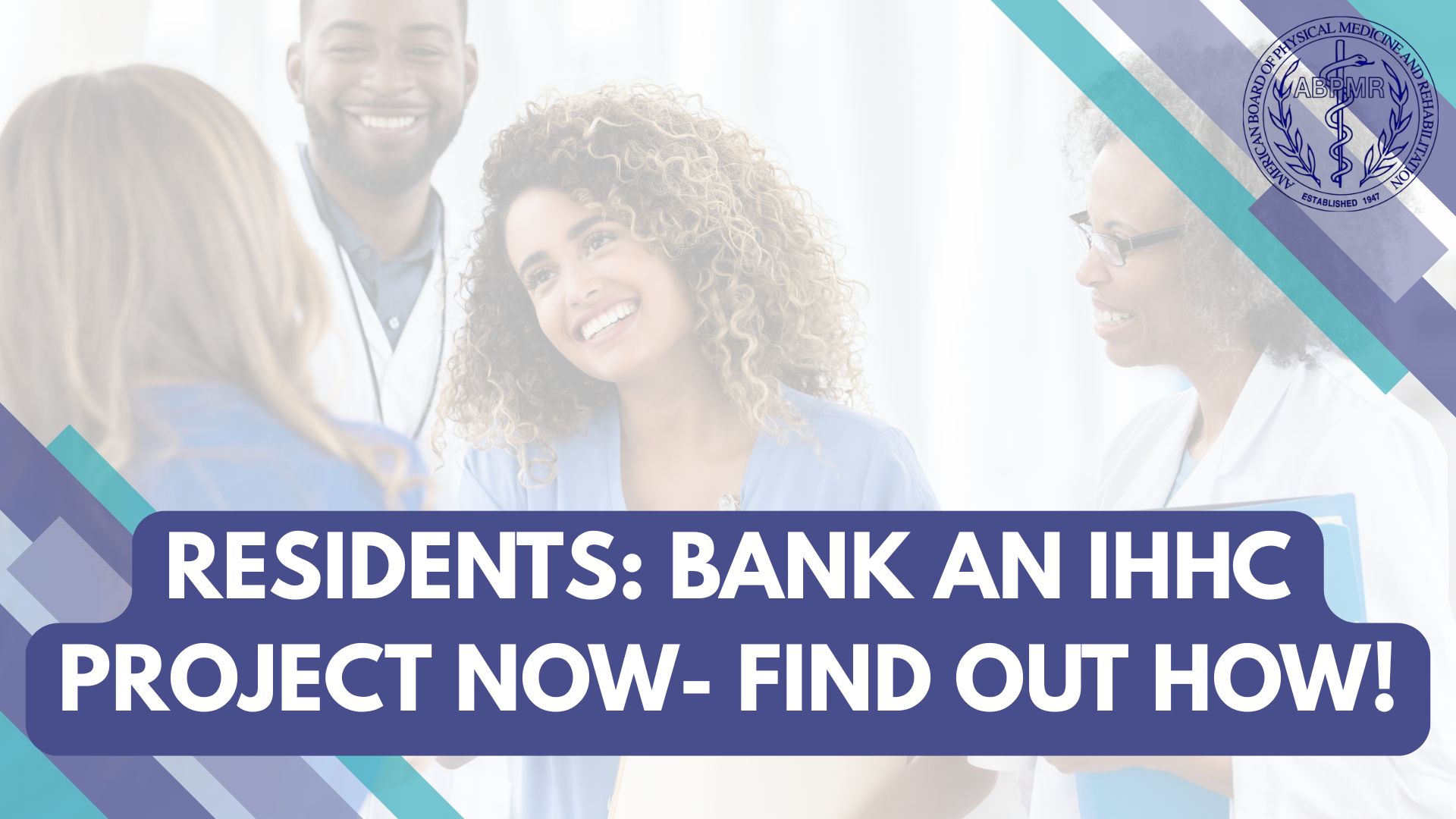CC
IHHC (QI) Spotlight: Reducing the risk of surgical and postoperative complications of total knee arthroplasty (TKA) patients

This month our IHHC Project Spotlight was submitted by Amy D’Antonio, MD.
Dr. D’Antonio is a sports medicine fellowship trained inpatient physiatrist at Heritage Valley Sewickley Hospital in Pennsylvania. For the last 15 years, she has dedicated her time as a volunteer team physician for her former high school. Additionally, she has served as an adjunct professor at Carlow University, teaching Pharmacology and Physical Diagnosis.
“I have always taught students that being a good clinical provider requires one to care, communicate, and pay attention to detail.”
Thank you for submitting your project, Dr. D'Antonio!
The IHHC (QI) Project Spotlight is a periodic feature on the ABPMR News Center to highlight exemplary IHHC projects submitted by your fellow diplomates (or residents) for continuing certification (CC) credit. Diplomates can use the IHHC Project Spotlight as a tool to plan their own IHHCs or as a way to connect with other diplomates doing similar work.

What is the problem you are trying to solve?
As part of my hospital practice, I serve as a consultant for two orthopedic surgeons, specifically for their patients undergoing total knee arthroplasty (TKA). I am the sole physician consulted during their hospital stay, responsible for managing both their medical and rehabilitation needs. It has been incredibly disheartening and frustrating to discover, on a weekly basis, that patients cleared for surgery still had unresolved medical issues prior to the procedure. Additionally, there has been a rise in same-day surgery cancellations due to insufficient preoperative instructions or clearances. My goal is to enhance the preoperative surgical clearance process through thorough pre-consult chart reviews, aiming to reduce the risks of surgical and postoperative complications for these patients.
What data (objective measurements) do you have that supports this as a problem?
In November 2024, I took an inventory of the patients assigned to me as a consultant after their total knee arthroplasties (TKAs). Many of these individuals had insufficient preoperative clearances, which may have increased their risk of postoperative complications.
• Of 39 patients, 2 patients had their surgeries cancelled because they had not been informed to stop their GLP-1 agonist medication one week prior to surgery.
• 1 patient had his surgery cancelled for proteinuria, hyperkalemia and increased creatinine not addressed prior to surgery.
• 4 patients were on Eliquis and told to stop Eliquis 2 days prior to surgery rather than discontinuing 72 hours prior, which is required for spinal anesthesia. These 4 patients had to then undergo TKA under general anesthesia. General anesthesia carries more surgical risk, more postoperative pain and often delays postoperative rehabilitation secondary to patients having more grogginess and nausea compared to those having TKA under spinal anesthesia.
• 2 patients had positive urine cultures, one with >100,000cfu/ml Escherichia coli and one with >100,000cfu/ml Klebsiella pneumoniae, not treated prior to surgery with some questionable mild symptoms at time of surgery treated with additional antibiotics.
• 1 patient had mild hypokalemia prior to surgery whom I supplemented during hospital stay.
That is a total of 10/39 patients who had issues on the day of their surgery that should have been addressed prior to surgery in a four week period.
What is your opportunity statement? State the goal you hope to achieve.
My goal over the course of two months was to improve the preoperative clearance process for TKA patients, aiming to minimize their risks of surgical and postoperative complications. Additionally, I sought to establish effective communication with the orthopedic care coordinator nurses who collaborated with the orthopedists, gathered the preoperative clearance data, and led the preoperative TKA classes. My goal was to ensure a seamless continuity of care from the preoperative phase to the postoperative journey, ultimately optimizing the clinical outcomes for patients following TKA.
What is the underlying cause of the performance/quality problem?
We live in an era of medicine where many primary care physicians are office-based and no longer follow their patients at the hospital when they are ill or undergo surgery. As a result, the continuity of care is often lacking. Also, hospitals and outpatient practices appear to have less staff to manage the volume of data. Our hospital used to have more preoperative nurses who, alongside orthopedic care coordinator nurses would review preoperative data prior to the patient's surgery, but this staff was downsized during the COVID pandemic. The process from preoperative clearance to surgery lacks oversight. Medicine is advancing with new guidelines for new medications and new surgical guidelines as well. The preoperative clearance process needs to be continually updated.

What change(s) did you implement?
In accordance with HIPAA guidelines, at my hospital physicians are able to perform chart reviews on patients in anticipation of upcoming consultations. A four week orthopedic TKA surgery schedule is sent to my hospital email every Monday.
During a two month period, 10-14 days prior to a patient's TKA, I would perform a chart review checking:
Labs, EKG/Echocardiogram, pertinent imaging studies, physician preop notes, specialist's notes, medication list, recent hospitalizations, social history- obtained from preoperative TKA class which included house set up and household members available to aid post discharge, assistive devices used if any, plan for outpatient therapy, home therapy or skilled nursing facility post discharge.
If I found any significant findings during my review that appeared to have been overlooked, I would then reach out to the orthopedic care coordinator nurse. This nurse would then get in touch with either the patient or the relevant physician to resolve the issue before the surgery.
I also had weekly conversations with the orthopedic nurse who conducted the preoperative TKA classes to provide patients with general information to discuss with their primary care physicians (PCPs). Examples such as stopping their GLP-1 agonist medication one week prior to surgery and if on Eliquis or Xarelto, to also discuss with their PCPs stopping 72 hours before TKA for spinal anesthesia.
I would also contact social work services on surgery day if a patient requested a post discharge skilled nursing facility during the TKA class to begin that process of insurance authorization for skilled nursing facility in a timely fashion.

Did you achieve your goal or target from your opportunity statement? What data do you have to support your conclusion?
During my 2 month chart review, I developed a great relationship with the orthopedic nurses whom I would contact when finding patient issues that needed addressed. My such findings:
• 1 patient with an inferior wall infarct on preop EKG that was new.
• 1 patient with creatinine of 1.7 when in October 2024 Creatinine 0.8.
• 1 patient with > 100,000cfu/ml Escherichia coli, not treated.
• 5 patients on Eliquis -to address with PCPs, clearance to stop 72 hours prior to spinal anesthesia.
• 1 patient with mechanical heart valve instructed to stop Warfarin 4 days prior to surgery. Needed to obtain cardiology clarification that Lovenox bridge not necessary.
• 1 patient with hypokalemia.
• 1 patient with chronic lymphedema with cellulitis on same leg to undergo TKA.
• 1 patient with recent hospitalization for atrial fibrillation with rapid ventricular response that would need new cardiology clearance.
• 1 elderly patient who lived alone, had no family or friend support post discharge, who would need a skilled nursing facility referral.
Since adding information to the preoperative TKA class two months ago regarding stopping GLP-1 agonists one week prior to surgery, we have had 0 same day surgery cancellations due to a patient's failure to stop GLP-1 agonist 7 days prior.
The nurses and anesthesiologists have truly appreciated my input. I also have a good sense of each patient's history from my in depth early chart review notes that I am better prepared to manage the patient's medical and rehab issues postoperatively.

How will you maintain the success of your project going forward?
I will continue to perform chart reviews on anticipated consulted patients 10-14 days prior to their surgeries. I will continue to contact the orthopedic care coordinator nurses when a patient issue needs to be addressed prior to surgery. I will continue to update the orthopedic nurse who conducts the TKA classes on new medication, surgical, and/or medical guidelines that would apply to patients undergoing total knee arthroplasties. I will continue to provide continuity of care.
Caring, communication, and paying attention to detail are the requirements needed to optimize patient care in this fast paced medical world in which we live today.



